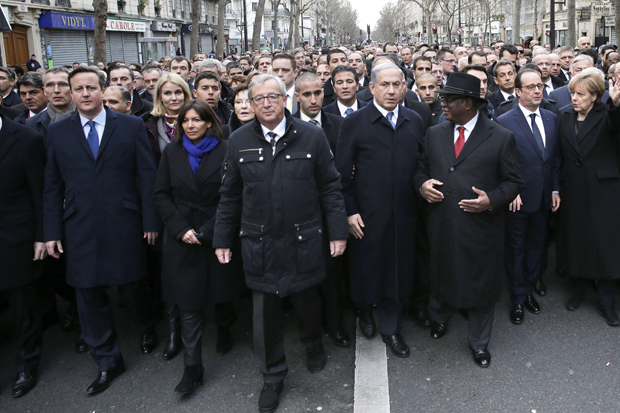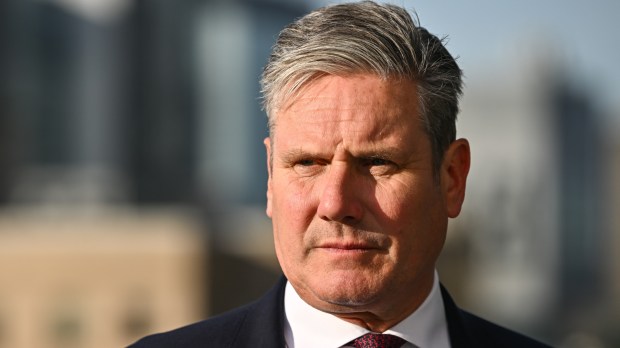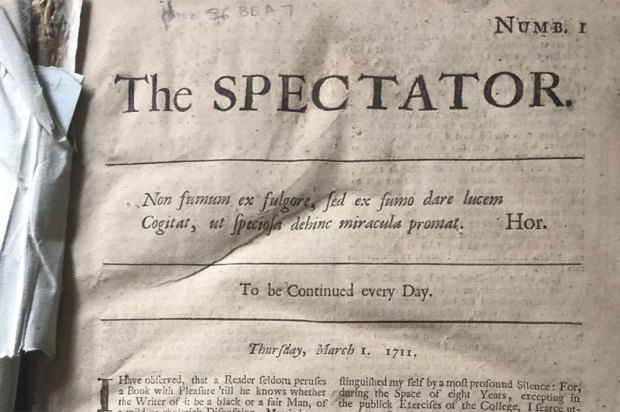Last Sunday, David Cameron marched through Paris in solidarity, so it seemed, with those who stand up for free speech. Anyone who thought he meant it must now be crying out, ‘Je suis un right Charlie!’ Hardly had the march finished than the Prime Minister had rediscovered his other side: the one which reacts to terror by threatening yet more surveillance, more state control. He has promised to revive, in the Conservative manifesto, the ‘-snooper’s charter’ which would allow the state to retain indefinitely information about every email we ever send, every telephone call we ever make.
Not only that. He added a further measure: he wants to ban all kinds of encrypted communications which the security forces struggle to decipher. ‘I think we cannot allow modern forms of communication to be exempt from the ability, in extremis, with a warrant signed by the Home Secretary, to be listened to,’ he said. The implication is that Britain could end up joining the group of countries, which includes Russia, China and Iran, where using services such as Snapchat and WhatsApp — which encrypt messages in just the way David Cameron suggests — is forbidden.
The routine has become tediously familiar, going back at least to Tony Blair’s proposal for 90 days’ detention without trial: government responds to terror attack by saying we will not be cowed, freedom will endure, or words to that effect — and then within days resolves to exploit public fear by forcing through illiberal measures. New powers are taken by the government in the name of national security — and end up being used by police to spy on journalists, or by Poole council to spy on parents whom they suspect of living outside a school catchment area.
Horrific though the French attacks were, they have changed nothing fundamental. We continue to face, as we knew we did before, a serious threat from Islamist terrorism. Security services are quite properly employed to identify and monitor suspects who may be plotting attacks. But in the Paris case, as in the Woolwich attack and the London tube bombings, there was nothing to prevent security services watching the suspects — as indeed they did until, by grave mistake as it turned out, they chose to stop in the belief that others were more dangerous. The security services already have powers to intercept any communication.
If anything, the trend in terrorism is towards more lone-wolf attacks. It is far from clear how they can be countered, but one thing is for sure: it is not through surveillance. Unless in the habit of talking to themselves, lone wolves have not much need to communicate their plans.
Why, then, Cameron’s obsession with collecting yet more communications data? It is a sign of a lack of confidence as a leader that he has resorted to a knee-jerk response. He feels the need to react in some way, for fear that the public will think that he is not in charge. And of course prime ministers are constantly assailed by civil servants, security chiefs, chief constables and the like, who demand more powers to make their lives easier. The taxman, especially, would love the chance to go through people’s emails.
A prime minister more sure of himself might, when approached by security forces complaining that it was too hard to decipher an encrypted WhatsApp message, tell them he is not going to inconvenience the public — who have good reason, given the shysters and criminals lurking on the internet, to encrypt their personal communications — and suggest they hire a latterday Alan Turing instead. It may annoy the police that technology is changing faster than their ability to hack into it, but is 21st-century Britain really going to ban technological advances?
In the past week, we have heard much about how free speech is a sacred pillar of an open society. In truth, our freedoms are being steadily eroded. The Public Order Act, which makes it an offence to write or say anything which is deemed to cause ‘alarm or distress’ to another person, has allowed police to enact a de facto blasphemy law, as well as making criminals out of harmless people who refuse to accept the orthodoxy on gay rights, feminism and many other things.
MPs who claim to support the right to free speech should be invited to carry ‘I am Harry’ banners in memory of Harry Hammond, a street preacher convicted under the Public Order Act for carrying a banner in Bournemouth saying: ‘Stop immorality. Stop homosexuality. Jesus is Lord.’ He was fined £300 and ordered to pay £395 costs, and died soon afterwards.
If David Cameron wants there to be a legacy from the tremendous welling up of public support for the murdered French journalists, he will review the various ways in which British laws restrict our right to say what we want. He could start by taking up the suggestion by the Culture Secretary, Sajid Javid, that a British Bill of Rights — something the Conservatives promised before the last election — should enshrine press freedom. Extend it into a commitment to free speech as strong as America’s First Amendment and David Cameron really could earn the honour of being a champion of freedom.
Got something to add? Join the discussion and comment below.
Get 10 issues for just $10
Subscribe to The Spectator Australia today for the next 10 magazine issues, plus full online access, for just $10.
You might disagree with half of it, but you’ll enjoy reading all of it. Try your first month for free, then just $2 a week for the remainder of your first year.














Comments
Don't miss out
Join the conversation with other Spectator Australia readers. Subscribe to leave a comment.
SUBSCRIBEAlready a subscriber? Log in